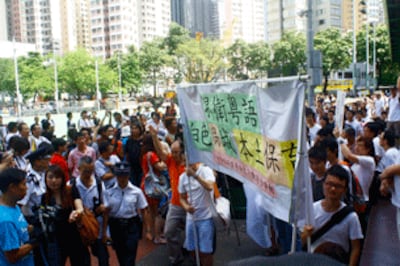HONG KONG—Hundreds of protesters rallied in support of their native Cantonese dialect in both Hong Kong and Guangzhou after a mainland Chinese political body called for cuts in Cantonese-language broadcasts, sparking fears that Cantonese culture is under attack from Beijing.
In Hong Kong, protesters carried placards and shouted slogans in support of Cantonese during a demonstration at a sports facility in the busy shopping and office district of Wanchai.
"If you can't understand what we're saying, then go back where you came from," read one placard, written in colloquial Cantonese.
In neighboring Guangzhou, the capital of Guangdong [formerly Canton] province which gave the dialect its name, police showed up early after learning about the protests from the Internet, and prevented those arriving from entering the city's People's Park wearing white clothing as a sign of protest.
"Cantonese people speak Cantonese!" the assembled protesters chanted at the cordon of police officers in the park.
"There are a lot [of police] here," said protester and Independent Chinese PEN member Ye Du. "There are more than 1,000."
"There are a few hundred [protesters] in the park, and a lot more stuck outside the park," he added. "The police are only letting people out of the park, but they're not letting anyone in."
Hong Kong support

In Hong Kong, protesters wore white or yellow ribbons around their wrist in support of Cantonese.
Participants said they had joined the campaign, which the Chinese government has said was started by rumor-mongering and people with 'ulterior motives', out of a fear that Cantonese culture would be marginalized.
Among the demonstrators was Citizen's Radio boss Bull Tsang Kin-sing, who called on Beijing to allow greater linguistic diversity within the People's Republic.
"Those in power want us to speak their dialect and dance to the beat of their drum, as a way of keeping control," Tsang said.
"But there are dozens of dialects in China; are they going to enact laws to ban them all?"
The protesters marched from Wanchai to the Central government offices in Hong Kong's main business district, where they held a rally and a discussion forum, before presenting a petition.
Some of the participants had traveled across the internal immigration border with the former British colony from Guangzhou to take part.
"Guangzhou has always been a bastion of civil society in China," wrote Inmediahk commentator Bobo Yip in an editorial Sunday.
"The fact that Guangzhou and Hong Kong are joining hands in the campaign to support Cantonese will bring them closer in terms of their cultural and political identities," Yip wrote.
"Hong Kong's spirit of freedom has infected mainland China. The attempts by the government to suppress Cantonese will aid its campaign against political dissent."
Protest organizers said they had exchanged news with fellow activists in Guangzhou via the microblogging service Twitter, and through the social media site Facebook.
"There will be a discussion forum simultaneously on Facebook and Twitter," organizer Choi Suk-fong said. "I hope to learn more about how they got on then."
Choi has said that Cantonese speakers, whose native tongue was often portrayed as a second-class language when Hong Kong was under British colonial rule, feel that their language is now under attack from Beijing.
Written Cantonese, which has been historically undesirable for both colonial rulers and anyone seeking to unify China under a centralized government from the north, has enjoyed a popular resurgence in recent years with the advent of SMS mobile phone messaging and text-based social media like Facebook and Twitter.
Reports denied
Chinese officials have denied reports that thousands of people took part in mass protests in support of the Cantonese language in recent weeks.
In a statement published on its website, the Guangzhou public security bureau said Sunday’s gathering at the People's Park was the work of "a small number of people with insufficient rationality and one or two with ulterior motives" and that "individual troublemakers would be punished."
Guangdong-based activists have reported intimidation by China's national security police in the wake of last week’s demonstration, and the Guangzhou authorities detained a man for five days on suspicion of “disseminating fake news.”
According to official media reports, the proposal that the city’s Guangzhou TV should either provide more Mandarin news bulletins or launch a new Mandarin channel was first put forward at the municipal-level Chinese People’s Political Consultative Conference on July 5.
Local newspapers have reported that the station has declined to comply, and provincial governor Huang Huahua has said the government has no plans to marginalize Cantonese.
The proposal was linked to Guangzhou’s hosting of the 16th Asian Games from Nov. 12-27.
Generally, television stations in China are required to use Mandarin, but Guangzhou TV was given special approval in the 1980s to broadcast in Cantonese to attract viewers from neighboring Hong Kong and Macau, which were still under British and Portuguese rule at the time.
Hong Kong returned to Chinese rule in 1997, with Macau following in 1999. Both territories are now Special Administrative Regions of the People’s Republic of China.
Hong Kong has a thriving movie industry and pop music scene, both of which produce a large part of their output in Cantonese, a dialect that is also widely spoken in overseas Chinese communities.
Original reporting in Cantonese by Li Li and in Mandarin by Xin Yu. Translated from the Chinese and written in English by Luisetta Mudie.
